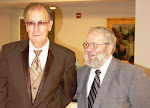James K. A. Smith teaches philosophy at Calvin College and is the author of a book, Thinking in Tongues: Elements of a Pentecostal Worldview which will be published next year. In a recent article in Christianity Today, he wrote of his theological position, that of a calvinist pentecostal. It's an interesting article; I think he's probably a nice fellow, and I have no reason to doubt his salvation. Most of what he wrote simply did not resonate with me, but that's cool--much of it is experiential stuff anyway. He did make some theological statements, too--one of which is so blatantly wrong, I am compelled to write about it.
"First, Pentecostals believe in healing--and they don't mean only "spiritual" healing. They think physical healing is part of what the Cross accomplished. God doesn't want to just save your soul; God also cares about your body. The Pentecostal emphasis on the healing of the body is an affirmation of the goodness of embodiment."
That is just so outrageous in so many ways, I hardly know how to begin.
1.) Non-pentecostals believe in healing also. Anyone who has ever gotten over an illness or recovered from an injury has been healed.....healed by God. God is the only source of healing. God also uses means. Not all His healing is delivered by direct intervention in some openly "miraculous" way (though all healing is indeed miraculous). God has provided, in His grace, doctors, medicines, and all that accompanies them.
2.) Mr Smith implicitly equates physical healing with spiritual healing so let's carry on the thought about means. Just as physical healing is accomplished by Him through means, He uses means to spread the Gospel of salvation: men, preaching the Word to every creature. God could have, in His sovereignty, intervened directly with the Good News. All men could have gotten the Word by some direct communication, just as God could heal any and all sickness by direct action. That is not the manner in which He has chosen to work out His plan.
3.) "Physical healing is part of what the Cross accomplished" Yes..........and No.........that is, No, not now. We all know ISA 53:4: with His stripes we are healed. This is the key verse for the "Healing in the Atonement" advocates. I am yet to be convinced that it refers to physical healing at all, though obviously all believers will experience an eternal "healing" when we are glorified. So, for this discussion, I will allow that it refers to physical healing as well as the very obvious spiritual healing.
First of all, then, healing for whom? Mr Smith is a calvinist and thus should know that the work on the Cross is efficacious only for the elect. So, there is no physical healing for the non-elect? But lost people get healed all the time, as an aspect of God's common grace.
And, the main question: healing when? If healing is "in the Atonement" then we believers should never be sick! Oh, wait.....some pentecostals make that healing dependent upon how much "faith" one has. Now, Mr Smith did not fall into that pit, but by staying out of it, he still must answer: If, like salvation of our souls, physical healing is a "benefit" of Christ's work on the Cross, then that healing should be ours, unqualifiedly, as the elect of God, as His children chosen before the foundation of the world.
If healing is in the Atonement, how can we explain Paul's ongoing infirmities? How do we explain: Erastus abode at Corinth: but Trophimus have I left at Miletum sick.
(2Ti 4:20)
Why did the Apostles die? They had the power to heal the sick and to raise the dead! (Matt 10)
4.) As I said, I am convinced that the healing referred to in Isaiah is specifically "spiritual" healing from the sickness of sin. Let's consider two passages of Scripture:
Peter quoted Isa 53 in one of his epistles--writing to believers, he said: by whose stripes ye were healed. (1 Pet 2:24)
Note the past tense. In verse 21, he wrote "Christ also suffered for us....."........PAST TENSE......Done. Finished.
Christ suffered for us.
By His stripes we WERE healed.
Obviously, this does not refer to my arthritis from which I have not been healed. It is decidedly a reference to the sin-sickness of those to whom Peter wrote, and it is a reference to the sin-sickness of all those who have been born again by the Spirit of God, had their sins forgiven, been made new creations in Jesus Christ. We WERE healed.
5.) A final word on ultimate healing. There's no doubt about eventual glorification for believers. Romans 8:30
That this final phase of our salvation, following justification and sanctification, is a product of Christ's work on the Cross is undeniable. And, it's plain from Scripture that it is not something which happens in this sin-corrupted body. We must be changed. We are temporarily bound to a death-doomed, sin-weakened body. It's end is certain: death and the grave. But.......death was defeated on the Cross, right? Yes!
"Christ has broken the power of Satan, who held the power of death (Heb 2:14), at the Cross. But Satan will not be permanently divested of his weapon of death until the end of the Millennium. " John MacArthur
The last enemy that shall be destroyed is death.
(1Cor 15:26)
6.) "God doesn't want to just save your soul; God also cares about your body" At first glance, it seems risky to contradict that statement. You want to say that God does not care about your body? But what Mr Smith is doing here, by accident or design I'm not sure, is equating spiritual salvation and physical healing--making them equals. I want to state unequivocal disagreement with that notion. God did not send his only begotten Son to die on that cross with a view to redeeming our corrupt bodies. Those bodies are temporal things of His creation. All His creation is perverted and corrupted by sin. He sent His Son to redeem us from sin and the ultimate redemption of all His creation comes with that, but these bodies are going to be changed, changed into glorious bodies like unto His. The work of Christ in redemption was not a job of patching up damaged goods. When a man is born again by the miraculous work of the Holy Spirit, he is a New Creation, not a repaired sinner. When God heals our temporal body, it is just that: a temporary repair done to something which is doomed to the grave, now or later, it's going there. The two works are by no means equal. God's concern cannot be considered equal between the salvation of the souls of His elect and the temporary delaying of an inevitable physical death.
7.) "Pentecostal emphasis on the healing of the body is an affirmation of the goodness of embodiment." OK, my first thought here is: What on earth is "affirmation of the goodness of embodiment"? "Affirmation" and "embodiment" must be a couple of the latest buzz-words in neo-evangelicalism. I do hear the "affirmation" word now and then in my circles (and think maybe I've fallen into using it myself once or twice). To me, it means: I did X and the next day Y happened giving me affirmation that God was in it. True affirmation from God comes via the witness of the Spirit and the Word of God, not from fleshly rationalizations or coincidences.
Anyway, what is this he has affirmation of?--"the goodness of embodiment"..........I re-read the article hoping to find that he had defined that jewel of an expression and, sure enough, here it is:
"An important piece of that affirmation is the goodness of embodiment--the goodness of the stuff we bump into, the bodies we inhabit."
Got it now? Me, neither......But it's born out of his view that Reformed theology has a strong appreciation for the "goodness" of God's creation, the material universe. And, since our bodies are part of that Creation, we should see and enjoy the "goodness" of them.
First of all, I've never seen much emphasis in Reformed writing or preaching about the "goodness" of the material universe in the way Mr Smith sees it. Subject to correction, I do not think he is echoing the Psalmist who wrote:
The heavens declare the glory of God; and the firmament sheweth his handywork.
(Psa 19:1)
Mr Smith seems to be overlooking the fact that all God's once "good" Creation is now under a curse. The once eternal bodies of Adam and Eve are now cursed by the effects of sin and ultimately, death. What was once "good" "very good" and indeed perfect, has become corrupt, defiled, twisted, and defeated by sin.
That Fall is what necessitated the work of our Redeemer. Not only does man need to be redeemed from the curse of sin and death, but all God's Creation:
Because the creature itself also shall be delivered from the bondage of corruption into the glorious liberty of the children of God. For we know that the whole creation groaneth and travaileth in pain together until now.
(Rom 8:21-22)
CONCLUSION:
The danger of this emphasis on physical healing and the "goodness" of the material universe lies in overlooking the great cost of sin and its effect on man and the rest of God's creation. If this material universe is "good" well, maybe man isn't so bad, either. We just need to appreciate ourselves more, seek out that notorious "spark of goodness" which lies buried in every heart (!) It's a short step from this kind of thinking to a watered-down gospel which is not the Gospel.
Wednesday, May 14, 2008
Subscribe to:
Posts (Atom)







